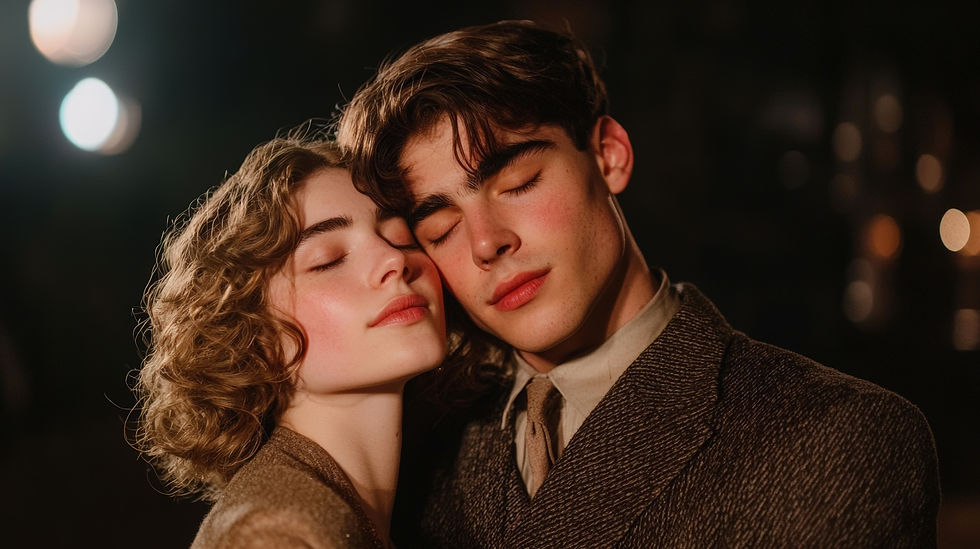On-screen couples: Angles and perspectives of films in competition at the Cannes Film Festival
- Sabrina B.

- May 16, 2025
- 4 min read

On-screen couples: When the Cannes competition probes intimacy
Beyond competing for the prestigious Palme d'Or, the Cannes Film Festival offers a unique platform for filmmakers from around the world to explore the intricacies of human relationships. Among the recurring and universal themes, the couple occupies a prominent place, scrutinized from a multitude of angles and perspectives. The films in competition have often portrayed with remarkable acuity the joys, hopes, tensions, and disillusionments that run through life as a couple. This article offers a deep dive into these striking representations.
The First Fires of Love: Idealization and First Trials
Many films presented in competition at Cannes captured the genesis of a romantic relationship, that period of idealization when the other appears surrounded by a special light. Works like " Blue is the Warmest Color " by Abdellatif Kechiche (Palme d'Or) explored with raw intensity the awakening of desire and the construction of a budding intimacy, while showing the first frictions and challenges related to self-affirmation within the couple. Other films depicted the confrontation of this ideal love with the reality of personality differences, mutual expectations, and the first trials that can either bring a couple together or reveal their fragility.
The erosion of time and marital crises:
The Festival has also often shone a spotlight on couples facing the wear and tear of time, routine, boredom, or existential crises. Films like James Ivory's "Divorce" (2003) (in competition) analyzed with sometimes wry humor the complex dynamics and resentment that can build up within a couple on the verge of separation. Infidelity, a recurring theme, was explored from a variety of perspectives, from its devastating emotional consequences to attempts at forgiveness and reconstruction, as seen in some award-winning works.
Power games and toxic dynamics:
Some films in competition delved into the darker aspects of relationships, highlighting subtle or violent power dynamics , emotional manipulation , and forms of emotional dependency . Some notable works explored how one partner can exert control over the other, the psychological consequences of these toxic relationships, and attempts to break free. These often disturbing depictions provoke profound reflection on the health of relationships and the need to set healthy boundaries.
Communication within the couple: Unspoken things and attempts at dialogue:
Communication between couples in cinema is a central theme in many of the films presented at Cannes. Difficulties in expressing one's needs, awkward silences, misunderstandings, and attempts to reconnect are all facets explored on screen. These works highlight the crucial importance of authentic and vulnerable communication in maintaining the emotional connection between couples and overcoming obstacles.
The couple facing external challenges: Society and context
The Festival also presented films examining the impact of social, political, or cultural context on couple dynamics. Works set in times of war, social crisis, or forced exile show how external challenges can strengthen or weaken a couple. Cultural differences within a multicultural couple , a potentially relevant theme for Monaco audiences, were also explored.
Other examples of notable films in competition at Cannes exploring the couple:
To illustrate the diversity of representations of the couple at the Cannes Film Festival, here are some examples of films that have made an impression:
"Chronicle of a Temporary Affair" (2022) by Emmanuel Mouret : A subtle and dialogued analysis of the vagaries of an adulterous relationship and its emotional implications.
Ingmar Bergman's "Persona" (1966) : Palme d'Or. A psychological masterpiece that explores the fusion and dependence between two women, whose ambiguous relationship can be interpreted from the perspective of a couple.
Michelangelo Antonioni's "L'Avventura" (1960) : Jury Prize. An enigmatic film that explores boredom and distance within a bourgeois couple in crisis.
Ingmar Bergman's "Scenes from a Marriage" (1973) : Although originally a television series, its theatrical version was screened out of competition and profoundly influenced the on-screen portrayal of the couple. It offers a raw and honest dissection of the disintegration of a marriage.
"Marriage Story" (2019) by Noah Baumbach : Presented out of competition, this poignant film offers an intimate and heartbreaking portrait of divorce and its emotional consequences on a couple and their child.
Psychological Analysis: Reflections of Our Own Intimacies:
The appeal of these cinematic depictions of couples lies in their ability to resonate with our own experiences and relationship challenges. These films can offer us new perspectives, help us better understand our own dynamics, and encourage reflection. From a psychological perspective, they are a source of learning and may even, indirectly, encourage us to seek professional support such as film-based couples therapy or online couples counseling .
For further information: Online support for your relationship in Monaco and beyond:
If the themes addressed in these films about couples at the Cannes Film Festival resonate with you, or if you're experiencing relationship difficulties, don't hesitate to consider an online consultation with a couples therapist. A professional space can offer you personalized support to improve your communication, overcome crises, and strengthen the bond within your relationship, whether you're in Monaco, the French Riviera, or elsewhere.
Keyword: couple films Cannes, relationships cinema Cannes competition, couples therapy cinema
Sabrina Beloufa - Psychologist, Sexologist, Couples Therapist






Comments